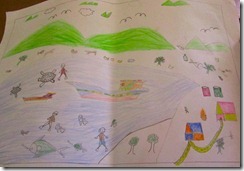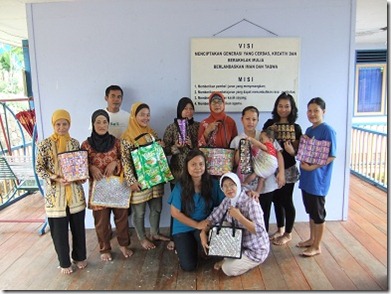In 2011 Mir and her crew visited the Anambas Islands and enjoyed all its beauty and hospitality. However the volume of waste washing up on the beaches of the remote island Durai, and the waste floating in the harbor and around the villages was concerning.
Waste management is an increasingly important issue across the planet with rising populations and disposable consumerism society. Landfills are expensive to build properly and are becoming full, and many less developed areas struggle to collect and process waste at all. It can be especially difficult for small communities to recycle as there needs to be a market for the resources and enough material to make the transportation economically viable.
Terempa is the capital of the Anambas Islands; it is one of the few places with a waste management scheme. The waste is taken from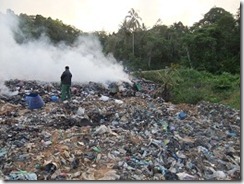 the town up into the hills to a small site where it is sorted for useful and saleable scrap such as metal, cardboard, cans, and plastic bottles. At present the price for plastic bottles is so low that it is not worth them transporting the bottles from the island so they are being kept in the hopes prices rise. All other waste is burnt.
the town up into the hills to a small site where it is sorted for useful and saleable scrap such as metal, cardboard, cans, and plastic bottles. At present the price for plastic bottles is so low that it is not worth them transporting the bottles from the island so they are being kept in the hopes prices rise. All other waste is burnt.
In an effort to help raise awareness about plastic pollution and waste recycling, Biosphere Association joined with Nina Marliana and Adrien Dyamantha, 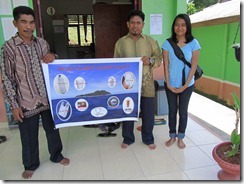 to collaborate with Pak Abu Hanifah of Matak and Ibu Isye of Rintis. The project was to give presentations in schools and run a workshop on reuse of waste plastic. In the three schools in Matak, the students learned that it takes many years for plastic to degrade and some only breaks down into smaller and smaller bits.
to collaborate with Pak Abu Hanifah of Matak and Ibu Isye of Rintis. The project was to give presentations in schools and run a workshop on reuse of waste plastic. In the three schools in Matak, the students learned that it takes many years for plastic to degrade and some only breaks down into smaller and smaller bits.
They realized after seeing pictures of birds and fish that died due to their stomachs being full of plastic bottle tops, lighters, cigarette butts, and other bits of waste; that what they throw away ends up in the ocean and potentially comes back to them in the fish they eat. The elementary school made their own posters about pollution:-
Ibu Isye hosted the workshop. She founded an organization Yayasan Panti Suhana Al’Muhajirin which now trains women with skills such as sewing. Pak Suparno (our partner at the “Friends of Menjangan” Project in Bali) and Ibu Yuliatin joined us from NW Bali to train seven 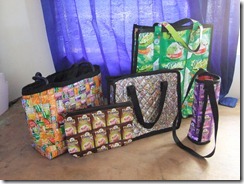 women how to reuse sachets and plastic packets from fruit drinks, coffee, washing liquid, and other plastic wrappers to make new useful and beautiful bags that can be sold. They have proved popular with tourists from around the world as well as locals.
women how to reuse sachets and plastic packets from fruit drinks, coffee, washing liquid, and other plastic wrappers to make new useful and beautiful bags that can be sold. They have proved popular with tourists from around the world as well as locals.
Many of the sachets had to be gathered from the tip because this was a new idea for people to save and wash their rubbish instead of just throwing it away. Together, a good quantity was collected and washed and the men at the tip promised to help by sorting out any more that came in. When local people saw what could be made, they too started separating some of their waste and brought it to us. Some sachets were folded and sewn together in strips to be woven, and the stronger material was used flat to make sturdy shopping bags. 
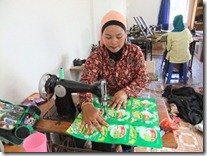
The sachets and wrappers that were ripped or too small were shredded to make multi-coloured handbags. 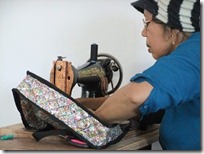
During the workshop the ladies learnt six designs and completed eight bags and one waste bin. Already they were planning new concepts and ideas for the future, and another village is waiting for them to give a workshop.
With thanks to the support of:
Nina Marliana, Adrien Dyamantha, Dhany Sudirwan, Ibu Isye, Pak Abu Hanifah, Wiwin, Wahyudi, Pak Syahril, Anggoro Yudo Mahendro, Pak Suparno, Ibu Yuliatin, and to Ibu Umsimah, Ibu Marlina, Ibu Muina, Ibu Mardiah, Ibu Usmah, Ibu Pristi, and Ibu Wiwi Diana who attended the workshop.

